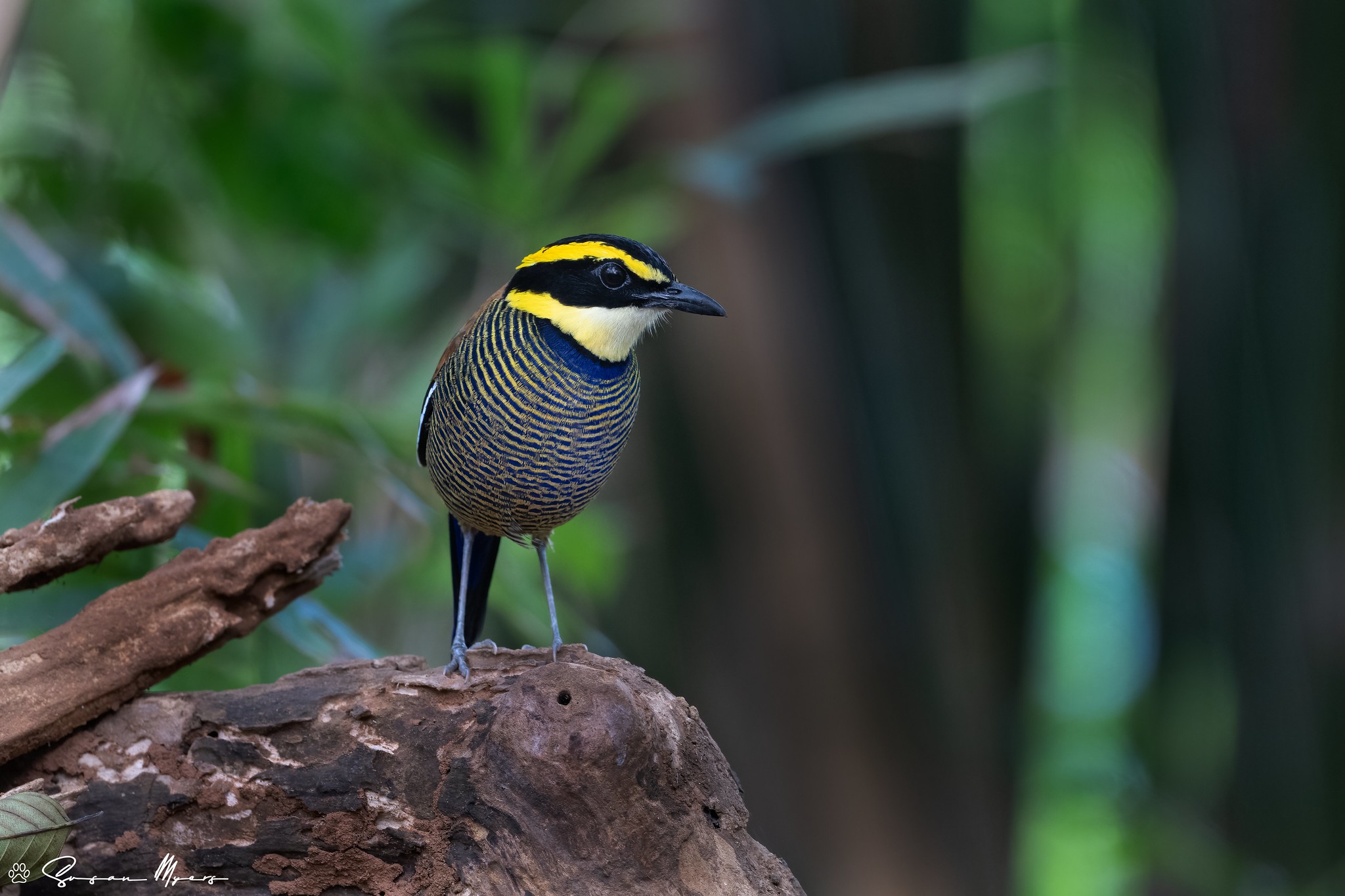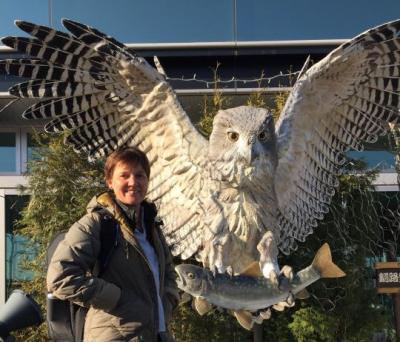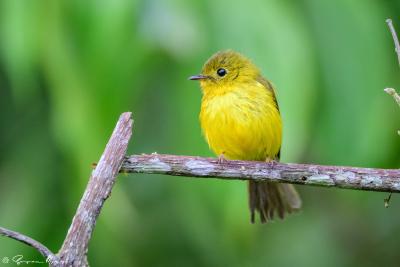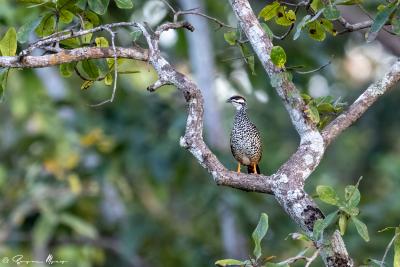Indonesia: Java and Sumatra
-
Aug 15 to Sep 5 2026
Susan Myers
Tour Price to be Determined

Tour Price to be Determined
Indonesia is the largest archipelago of islands in the world and ranks fourth for the number of bird species by country (Birdlife International, 2019) and has more endemic bird species (528!) than any other country. Sumatra and Java in particular has some of the most biodiverse forests. Our tour to Indonesia offers the chance to see new and wonderful birds, as well as other great wildlife, and experience a vibrant and fascinating culture.
Java is one of the most populous places on earth, but extensive areas of well-protected habitat remain and we’ll visit a selection of these reserves. Our main focus will be the fabulous Gunung Gede National Park, which encompasses the impressive volcanoes Gunung (Mount) Gede and Gunung Pangrango, both around 10,000 feet high. Rich montane forest spreads over the flanks of the two volcanoes and holds many of the most exciting Javan endemics. We’ll also visit the tranquil Cibodas Botanic Gardens, where another fine selection of endemics awaits us.
Closer to Jakarta we’ll explore local coastal sites, including Muara Angke, a tiny remnant oasis of marshland of about 65 acres that’s well known as one of the few remaining sites for the rare Sunda Coucal. In the same area a few scattered pools often hold Javan Plovers, so we’ll search for them too. Lastly we’ll visit the attractive resort area of Carita, a coastal site where we can find a handful of lowland Javan endemics and enjoy the sea air and beautiful vistas.
Sumatra is a huge island, over 600 miles long, and with more than 600 bird species it offers excellent birding opportunities. Our first destination, Way Kambas National Park, is a large area consisting of a mixture of lowland forest, open grassland, and peat swamp forest. This important park is one of the best in Asia for nightbirds, and we’ll make an effort to find as many as we can. It also protects more than 50 mammal species, the most important of which are Sumatran Rhinoceros, Sumatran Elephant, Malayan Tapir, and the incomparable Sumatran Tiger, which is sadly now very rare. We’ll trek into the swamp forest during the day in our quest to find the increasingly rare White-winged Duck, along with the many other highlights that lie in store.
Kerinci-Seblat National Park lies in the middle of the Barisan Mountain Range and protects a large expanse of forest on the flanks of Gunung Kerinci, which at almost 12,500 feet is the highest mountain in Sumatra. This area is home to the remarkable Minangkabau people, devout Muslims and the world’s most populous matrilineal society. Three-quarters of Sumatra’s endemic birds have been recorded here, so naturally it is a very popular place with birders. The mixed flocks are often spectacular, and one of their most prominent birds is the stunning Blue Nuthatch. And we’ll search for some very special ground dwellers such as Schneider’s Pitta, Salvadori’s Pheasant and Sumatran Wren-Babbler.
After our time on Kerinci we’ll explore the Tapan Road, which passes through rich lower-elevation forest and offers us a chance to observe a very different suite of birds. We’ll bird at a leisurely pace along the road, where the enigmatic Bronze-tailed Peacock-Pheasant is always possible.
Day 1: The tour begins at 6 p.m. in the lobby of our Jakarta hotel. Night in Jakarta.
Day 2: We’ll visit areas north of Pamanukan and at various locations in Muara Gembong including Singkil, all sites that are around two hours from Jakarta and relatively easy to access. We’ll explore mangroves, fish ponds, and rice paddies in search of our first endemics and specialties, which may include the increasingly rare Milky Stork, Javan Plover, the endemic Sunda Coucal, Javan White-eye, and with luck Java Sparrow. Night in Jakarta.
Days 3–4: We’ll travel to Gunung Gede National Park, where our main objective will be the Javan highland endemics but also the outstanding forest and the spectacular volcanoes for which Indonesia is renowned. Habitats here range from lush submontane forest to alpine meadows. We’ll spend a bit of time on the lower flanks of the mountain in the Cibodas Botanic Gardens, which is best for a few endemics such as White-flanked Sunbird, Pygmy Tit, and Sunda Forktail, but we’ll mainly concentrate on the Gunung Gede trail. Almost all the Javan endemics can be found in this important national park, and by exploring the main trail we’ll almost certainly encounter mixed feeding flocks containing a number of our hoped-for species, including White-bibbed and Crescent-chested Babblers, Dark-throated White-eye, Orange-spotted Bulbul, and perhaps even Javan Trogon. There are as well some exciting ground-dwelling birds to seek out, such as the very cute Javan Tesia, Sunda Thrush, or the secretive Chestnut-bellied Partridge. Nights in Cibodas.
Days 5–6: We’ll leave Gunung Gede and travel the short distance to Halimun, a national park set at a slightly lower altitude and where the hill and submontane forests hold several species that aren’t found at other sites in western Java. White-breasted Babblers are fairly common, and mixed feeding flocks may hold the endemic White-bellied Fantail as well as Sunda Minivet, Grey-throated White-eye, Javan Sunbird, and Grey-cheeked and Sunda Bulbuls. Dark-backed Imperial-Pigeons can be heard calling from the forest canopy, where they often perch conspicuously on dead snags. Sumatran Green-Pigeon is found here, and Javan Hawk-Eagle can sometimes be seen soaring over the treetops. One of our main targets will be the much sought-after Spotted Crocias, an inconspicuous but rather glamorous canopy dweller that is found only in this small area of western Java. Nights in Halimun.
Day 7: We’ll travel to the seaside town of Carita, known for its pristine white beaches, turquoise tropical waters, and views of the legendary Krakatau (Krakatoa) volcano. We’ll bird in the remnant forests near the town, where the density of birds is low but we may nevertheless see some fine, localized endemics: Grey-cheeked Tit-Babbler, White-breasted Babbler, and Black-banded Barbet. We may also encounter Banded Kingfisher, Banded Broadbill, Banded Pitta, Bay Banded Cuckoo, and a few other non-Banded things. Nightbirds such as Sunda Scops Owl, Large-tailed Nightjar, and Javan Frogmouth are also possible. Night in Carita.
Day 8: We’ll have a full morning of birding in the forest patches around Carita. Few areas of intact lowland forest remain in Java, so extra time exploring these remnants around Carita will give us second chances at some of the increasingly scarce lowland specialists. After lunch we’ll return by vehicle on crowded roads to Jakarta in preparation for tomorrow morning’s flight to Bandar Lampung in the south of Sumatra. Night in Jakarta.
Day 9: Depending on our flight schedule, we may have some time to bird at Muara Angke in the morning before we go to the airport for our short flight to Bandar Lampung. On arrival we’ll meet our driver and transfer to our accommodation near Way Kambas National Park. Our charming guesthouse is located just outside the park, so this afternoon we’ll get a start on our birding adventures soon after we check in. Night at Alam Way Kanan Guesthouse.
Days 10–12: Way Kambas National Park, a 320,000-acre lowland swamp forest island in a sea of humanity, is well known for its large mammals and lowland specialist bird species. Although partly degraded by logging, it is now well protected and offers refuge to a number of endangered species, including Sumatran Tiger, Javan Rhino, White-winged Duck, and Wrinkled Hornbill. Our main quarry here will be White-winged Duck and some nightbirds, and from a list of the latter we may be lucky enough to see Bonaparte’s Nightjar, Brown Hawk-Owl, and Gould’s Frogmouth.
We’ll bird the entrance road around Way Kanan Pos and the Look Trail, and in the evenings we’ll spotlight along the entrance road just a short way from our accommodation. The Look Trail is good for pheasants and partridges, and Banded Pitta is regularly seen here and on the main road. One morning we’ll travel by boat upstream from the park headquarters to Rawa Gajah (Elephant Swamp) and to the Alang Alang for White-winged Duck. Later we’ll continue birding along the entrance road before taking a boat trip downstream to Pertama Swamp and Kali Biru Pos. Cinnamon-headed Green Pigeon is relatively common here, and we should find the stunning Small Blue Kingfisher. Nights at Alam Way Kanan Guesthouse.
Day 13: We’ll fly back to Jakarta from Bandar Lampung, continue by air to Padang in central Sumatra, and then drive from Padang to Kersik Tuo near Gunung Kerinci. Our drive will mostly be through the hilly terrain that typifies this part of Sumatra, traversing a mosaic of forest, farmland, and villages. We’ll make occasional stops for birding around Lake Kerinci and surrounding swamps and padis. Night in Kersik Tuo.
Days 14–16: Kerinci-Seblat, in the southern Barisan Ranges in Sumatra’s southwest, is Indonesia’s second-largest national park. With its large area and altitudinal range from lowlands up to the alpine areas at the summit of Gunung Kerinci, the park is exceptionally important for its protection of a wide range of habitat, including lowland dipterocarp forest, lakes and wetlands, montane and hill forests, and alpine woodlands. Biodiversity within the park is extraordinarily high with many endemics and a plethora of rare or restricted-range Sumatran birds, mammals, reptiles, invertebrates, and plants. Botanically, Kerinci-Seblat National Park is said to be more than twice as rich as the Amazon Basin.
Most of the restricted-range birds occur in the hill forest along the Tapan Road and in the montane forest on the slopes of Gunung Kerinci and Gunung Tujuh. There are fifteen Sumatran endemics to be found within the boundaries of the park and a further six shared only with Java. A number of other important species are shared with peninsular Malaysia, Java, or Borneo, including the spectacular Fire-tufted Barbet, a monotypic genus confined to the upland forests of peninsular Malaysia and Sumatra, and delightfully common on Gunung Kerinci and along the Tapan Road.
On the slopes of Gunung Kerinci the diminutive ground-dwellers may distract us from our main task of searching for the endemics. Sunda Robin, Lesser Shortwing, and White-browed Shortwing are all common. The lower stretches of the forest appear to be wren-babbler heaven: the vocalizations of Pygmy, Eyebrowed, and Rusty-breasted Wren-Babblers provide a constant background symphony, while the fascinating Long-billed (otherwise found only in the Himalayas) is much more retiring. Blue Nuthatch is shared with Java and peninsular Malaysia, and is a major constituent of mixed flocks, whose other species include White-browed Shrike-Babbler, Grey-throated Babbler, and Golden Babbler. It seems that rainy days are good for the ground-dwelling species, while better weather brings out numerous mixed flocks and canopy-dwelling species. We’ll hope for a bit of both. Gunung Kerinci is also noted as a great site for some very scarce nightbirds—Pale-headed Frogmouth, Rajah Scops Owl, Barred Eagle Owl, and Salvadori’s Nightjar. Nights in Kersik Tuo.
Days 17–19: We’ll transfer to Sungai Penuh and spend the next three days birding along the Tapan Road, which allows us to access the midmontane and lower elevations of Kerinci-Seblat National Park. The area between the Bukit Tapan Pass (4900 feet) and the small village of Muara Sako lies within the national park and shelters some wonderful hill and lower montane forest. This is the best site for a number of Sumatran endemics as well as many more widespread and spectacular Sundaic species. Our best strategy is to walk along the road from the pass down to Muara Sako, which will take us a full day but we’ll be followed by our bus for those needing a break. Two of the specialties here are Graceful Pitta and Bronze-tailed Peacock-Pheasant, both of which are shy forest dwellers but with perseverance we have a chance. Nights in Sungai Penuh.
Day 20: We’ll spend the morning birding along the road, first on a trail near Bukit Tapan Resort and then along a particularly good stretch of road, trying to catch up with anything we may have missed. Later in the morning we’ll make the long drive back to Padang. Night in Padang.
Day 21: We’ll return to Jakarta from Padang, Sumatra’s third-largest city, for a last evening in the comfort of our beautiful hotel. If our flight schedule permits, we’ll enjoy some relaxed morning birding at forested sites on the outskirts of Padang, where we might find some widespread Southeast Asian species such as Coppersmith Barbet, Greater Green Leafbird, or Crimson Sunbird. Night in Jakarta.
Day 22: The tour concludes this morning in Jakarta.
Note: The information presented below has been extracted from our formal General Information for this tour. It covers topics we feel potential registrants may wish to consider before booking space. The complete General Information for this tour will be sent to all tour registrants and of course supplemental information, if needed, is available from the WINGS office.
ENTERING INDONESIA: A passport valid for at least six months beyond your planned arrival date and containing at least two blank pages for entry stamps is required for United States citizens to enter Indonesia. U.S. citizens are required to have a visa to enter Indonesia, obtained either beforehand or on arrival.
Citizens of other countries should check with their consulate/embassy for instructions.
Visitors coming directly from countries where Yellow Fever is endemic must have a current vaccination.
COUNTRY INFORMATION: You can review the U.S. Department of State Country Specific Travel Information here: https://travel.state.gov/content/travel.html. Review foreign travel advice from the UK government here: https://www.gov.uk/foreign-travel-advice and travel advice and advisories from the Government of Canada here: https://travel.gc.ca/travelling/advisories.
PACE OF THE TOUR: Our birding days will normally begin quite early; we are very close to the equator so sunrise is around 6:00 a.m. and sunset around 6.00 p.m. On most days we’ll bird in the morning until the midday heat arrives, with a break after lunch. We’ll inform you of trail conditions ahead of time so that anyone who wants to opt out has that opportunity.
The longest walks will be at Gunung Gede and Kerinci, where in both cases we will take a trail uphill into the forest for a day of birding. These hikes are about five kilometers (three plus miles). Otherwise most of the walking is fairly easy, on flat terrain with plenty of stops for birding. Very often we’ll be birding from or close to the vehicle. At this time of year temperatures are relatively low but it is nevertheless mostly hot and humid, although cooler in the hills and on the coast.
There are some drives of three to four hours, and six internal flights.
HEALTH: The Centers for Disease Control and Prevention (CDC) recommends that all travelers be up to date on routine vaccinations. These include measles-mumps-rubella (MMR) vaccine, diphtheria-tetanus-pertussis vaccine, varicella (chickenpox) vaccine, polio vaccine, and your yearly flu shot.
They further recommend that most travelers have protection against Hepatitis A and Typhoid.
Please contacting your doctor well in advance of your tour’s departure as some medications must be initiated weeks before the period of possible exposure.
The most current information about travelers’ health recommendations can be found on the CDC’s Travel Health website at http://wwwnc.cdc.gov/travel/destinations/traveler/none/indonesia .
Malaria: A malaria prophylaxis is recommended. Please consult your physician.
Smoking: Smoking is prohibited in the vehicles or when the group is gathered for meals, checklists, etc. If you are sharing a room with a nonsmoker, please do not smoke in the room. If you smoke in the field, do so well away and downwind from the group. If any location where the group is gathered has a stricter policy than the WINGS policy, that stricter policy will prevail.
Miscellaneous: Mosquitoes can be present in the forests at this time of year so long sleeves and pants are recommended. At some sites chiggers can be a problem depending on climatic conditions. Leeches can be a problem in this part of the world, dependent upon recent rain. They are easily repelled by a strong all-purpose repellent, with at least 30% active ingredient such as DEET.
CLIMATE: Like other regions in Indonesia, Sumatra and Java have a typical equatorial climate with two seasons: wet and dry. The main variable of Indonesia’s climate is not temperature or air pressure, but rainfall. The dry season reliably falls between April and October. Mean temperatures at sea level are uniform, varying by only a few degrees throughout the region and the year 78°- 82°F (25°- 28°C). However, temperatures decrease 2°F (1°C) for every 656 feet (200m) of altitude, which provides a cool pleasant climate in upland communities. Even during the dry season humidity can be quite high at certain sites. Strong cyclones and typhoons, which normally occur in higher latitudes, are absent in Indonesia, but afternoon thunderstorms are relatively common.
ACCOMMODATION: Our accommodations are generally Western-style hotels or more simple Indonesian style lodges. The bathing in the Indonesian style lodges are sometimes mandi which involves using a small container to scoop water out of a large container and pour water over the body, in such a way that this water does not go back into the large container. In all cases privacy is possible. Toilets in most places are western style. WiFi is increasingly common in hotels, airports, restaurants and cafes though less so in remote areas and small establishments. In the hotels in the main towns free wifi is generally available.
FOOD: The food in Indonesia is varied and generally delicious. Vegetarian options are somewhat limited but by no means out of the question. Most meals are served with meat such as beef or, more often, chicken, pork is not usually available and fresh seafood is a specialty in this huge archipelago. We will enjoy a mix of Indonesian and western style meals throughout (but mostly Indonesian). The food in this part of the world has a reputation for being spicy but in Indonesian cuisine, chili or “sambal” (similar in some ways to salsa) is usually added to the meal at the table and is thus optional.
Food Allergies / Requirements: We cannot guarantee that all food allergies can be accommodated at every destination. Participants with significant food allergies or special dietary requirements should bring appropriate foods with them for those times when their needs cannot be met. Announced meal times are always approximate depending on how the day unfolds. Participants who need to eat according to a fixed schedule should bring supplemental food. Please contact the WINGS office if you have any questions.
TRANSPORTATION: We will be traveling in two or three 4WD vehicles throughout. Seating in the vehicles will rotate, and participants should be able to ride in any seat in tour vehicles. There are as well a number of internal flights on major internal airlines.
2023 Narrative
Our Java and Sumatra tour of Indonesia this year was nothing short of brilliant! Thanks in large part to an excellent group, thank you everyone. Here’s a brief recap of our journey.
Muara Gembong
Muara Gembong is located at the delta of the Citarum River, on the Bay of Jakarta, about a two-hour drive from that city. We began our first birding foray with a fruitless search for one of Java’s rarest birds, the Javan White-eye. Despite our lack of success with this popular cagebird (which explains its rarity), we not only had a fun time exploring new ground, but we also added a handful of species that we were only to encounter here. A mix of paddyfields, mangroves and coastal scrub proved to be popular with a nice mix of waterbirds and small passerines. Here we had our first encounters with the gorgeous Small Blue Kingfisher, happily still very common, as well as White-browed Crakes, Purple Herons, Savanna Nightjars, Yellow Bittern and more. The best sighting of the morning was undoubtedly the unexpectedly excellent views of Ruddy-breasted Crakes as they happily foraged in the muddy roadside canals. After our first of many breakfasts in the fields, we continued on our way to the next destination for a complete change of pace.
Kawah Putih
Kawah Putih translates literally as White Crater, a very apt name for the crater lake that has become a popular tourist destination for local Indonesians. Kawah Putih is one of two crater lakes to be found on Mount Patuha, a stratovolcano (a conical volcano built up by many strata of hardened lava and tephra or pyroclasts. They are characterized by a steep profile with a summit crater and periodic intervals of explosive eruptions and effusive eruptions. Yikes!) Our birding here was wildly successful and fun. How could it be otherwise – surrounded by beautiful forest, in cool mountain weather, with birds such as Javan Hawk-Eagle, Sunda Cuckooshrike, Pied and Trilling Shrike-Babblers, close up Pygmy Cupwings, Blue Nuthatch, Tawny-breasted Parrotfinch, and Javan Indigo Flycatchers. But the icing(s) on the cake were the Javan endemics – how about Javan Trogon, Javan Tesia, Pygmy Tit, Javan Grey-throated White-eye, and best of all, not one but two sightings of the elusive Javan Cochoa.
In fact, our birding here was so successful that we decided to cut short our stay by one night and move on to our next destination, where I knew the birding to be somewhat more challenging.
Gunung Gede & Cibodas
Mount Gede Pangrango National Park is a national park located near Jakarta in West Java; it is centred around two volcanoes—Mount Gede and Mount Pangrango and incorporates the world-renowned Cibodas Botanical Gardens. This important reserve is home to some of Java, and indeed Indonesia’s, greatest biodiversity. Our mission here was to see as many of the unique birds as our legs could handle – after all, the hike up this mountain is no walk in the park! (Figuratively, it literally IS a walk in the park). We spent a full day on the mountain, visiting the Cibeureum Waterfall, en route to Pos 2, which is about the halfway point to the summit, and stopping for a picnic lunch heroically brought up to us by our drivers. To say the birding was successful would be an understatement. We recorded over 40 species, which is impressive for Asian montane forests, and the list included some really special birds – Red-billed Malkoha, Flame-fronted Barbet, Rufous-tailed Fantail, Javan and Orange-spotted Bulbuls, Javan Tesia, White-bibbed Babbler, and White-flanked Sunbird. Of particular note were almost tame Javan Whistling-thrushes, and – the complete opposite – a truly infuriating Javan Shortwing that gave us two or three quick views, albeit it satisfying ones, after considerable effort!
The easier-to-handle trails in the botanic gardens were also rewarding, starting with early mornings views of the usually incredibly elusive Sunda Thrush, and followed by Yellow-throated Hanging-Parrots, Javan Banded Broadbill, Crescent-chested Babblers, and Lesser Shortwings, to name but a few. Departing Gunung Gede for our next destination, we were seen off by a very welcome Black Eagle as we began our long and bumpy journing to Halimun National Park.
Halimun National Park
After a long and bumpy drive, we arrived at the entrance to the national park. Before reaching our accommodation at the park guesthouse, we decided to stop for what we assumed would be a futile search for the increasingly rare Spotted Crocias, a Javan endemic in the babbler family. After all, this bird hadn’t been seen by any of the previous birding groups to visit here in the last year, but we had to give it a red-hot go. As we explored the forest with eyes and ears out, Roman and I heard a call and to our amazement we realised it was the crocias! We pinpointed the area from which it was coming, and eagle-eyed Roman spotted the bird. As we scoped it with great excitement, to our amazement the single bird was joined by another and then another – and then there were six! Incredible!
Further explorations of this beautiful and little-known area were rewarded with many exciting finds, including our only Sumatran Green Pigeon, Blue Whistling-Thrush, White-bibbed Babbler (that was a merry chase!), Javan Leafbird, Crimson-winged Woodpecker, and colorful Sunda Minivets. In the nearby tea plantations, we found plentiful Long-tailed Shrikes, Grey-rumped Treeswifts, Striated Grassbird, Javan Kingfisher, and a single Brown-backed Needletail.
Carita
Our stay at our last Javan birding destination, Carita was short but sweet. An afternoon and a morning visit added some excellent birds to our list. A short stay in a hide was fantastic with incredible close views of the stunning Javan Banded-Pitta, as well as the newly split Javan Black-capped Babbler. Later we encountered more excitement in the form of Yellow-eared Barbet, Freckle-breasted Woodpecker, Temminck’s Babbler, and Small Minivets. Notably, we had two excellent nightbirds - Brown Boobook and a pair of simply adorable Javan Frogmouths.
On our way back to Jakarta, in preparation for our flight to Padang the following day we were able to fit in a boat trip at Muara Angke Reserve located smack in the middle of Jakarta. This seemingly uninspiring little patch of mangrove forest and mudflats is famous for its healthy population of one of the world’s rarest waterbirds, the Milky Stork. We were lucky enough to see seven of these wonderful birds as well as Lesser Whistling Duck, Sunda Teal, Pied Stilt, Bar-winged Prinia, and more.
Gunung Kerinci
Thanks to a long flight delay out of Jakarta, we weren’t able to do any birding only our long drive from Padang to Kersik Tua, the jumping-off point for Mount Kerinci. The following few of days made up for that shortfall in every possible way.
After meeting our drivers, then a memorable Nasi Padang lunch, and lastly a quick stop at a beautifully preserved traditional Minangkabau palace, we traveled to our next birding destination.
We had two amazing days of birding on the slopes of Mount Kerinci, a 3,085m active volcano that is the highest peak in Indonesia. The forests that cloak the slopes of the mountain are rich in biodiversity and the local rangers and birders have set up an excellent hide that attracts some truly wonderful birds. Large Niltavas and Shiny Whistling-Thrushes were the most common visitors as we waited for moments of great excitement in the form of Bronze-tailed Peacock-Pheasants, Salvadori’s Pheasants, Schneider’s Pittas, Rusty-breasted Wren-Babblers and Red-billed Partridges. At one stage a Sumatran Trogon even showed up, and later we were shown a stunning Sumatran Frogmouth at its roosting site.
Danau Kaco
It was with great excitement that I learnt of a new site for one of the world’s most elusive birds – the Sumatran Ground-Cuckoo. So, at the last minute we added a visit to Lake Kaco to our itinerary. Our first visit was, well, we could only say, a failure. Quite disappointing as this was the most wanted bird of the trip for many of us, myself included. But not to be deterred we collectively decided to try, try, try again – and this time SUCCESS! Our patience really paid off as did Dwi’s hard work. The excitement was great as we approached the area where they’d been heard and as we hunched down in the forest a pair of these magnificent ground-dwellers appeared and put on an amazing show for us. What a bird!
Tapan Road
Moving on to another new town, we used Sungai Penuh as our jumping off point to a different part of the Kerinci-Seblat National Park. At a slightly lower altitude, essentially the foothills, we encountered a new and different suite of endemic birds here as well as more widespread Southeast Asian species. Another strategically placed feeding station was excellent for some otherwise almost impossible to see birds, namely Graceful Pitta and Marbled Wren-Babbler. Added bonuses as we birded from the roadside included Rhinoceros Hornbill, Green-billed Malkoha, Fire-tufted, Gold-whiskered and Black-browed Barbets, Black-and-crimson Oriole, and Cream-striped Bulbul.
Way Kambas
Our final destination, via a circuitous route through Jakarta and Bandar Lampung from Padang, was the lowlands – namely Way Kambas National Park in southern Sumatra. The invisible powers that be had very unfortunately decided to close the park to visitors, so we had to be content with birding around the edges. Fortunately, this turned out to be quite worthwhile with birds such as Sumatran Babbler, Red-crowned Barbet, Rufous-backed Dwarf-Kingfisher, Black-bellied Malkoha, to mention only a few.
A trio of nightjars was fun – Malaysian Eared, Large-tailed and Savanna Nightjars all circling around together in an open field at dusk in company with Blue-throated and Blue-tailed Bee-eaters.
An afternoon boat trip on the Pegadungan River was fun and birdy. Stork-billed Kingfishers and Black-thighed Falconets were two of the many highlights, as was the beautiful fiery sunset.
And that’s a wrap! The birds, the food, the friends conspired to make this a truly memorable trip in this remarkable part of the world. So many of my Indonesian friends smoothed the way for us with their consistently good-humored assistance and bird spotting.
Susan put together an excellent tour. I would travel with her anywhere, and plan to!
- John R. on Indonesia: Java and Sumatra
This was an amazing trip! Susan Myers is one of the best leaders I've known with incredible ID skills and a gift for positioning the group and getting everyone on the birds. I learned so much on this trip from her--not just about the birds, but about the natural and cultural history of the region. The ground crew was also great--especially in Java...We saw great birds at every location! I would really enjoy doing another trip with Susan.
- Mark G. on Indonesia: Java and Sumatra
Maximum group size eight with one WINGS leader.



